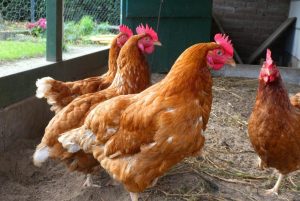Highly Pathogenic Avian Influenza Situational Report
— Content provided by Donna R. Coffin, Extension Professor, University of Maine Cooperative Extension, Piscataquis County, donna.coffin@maine.edu
Maine Animal Health Officials Respond to Avian Influenza
For more information contact: Jim Britt at: Jim.Britt@maine.gov
 Current Situation
Current Situation
USDA’s National Veterinary Services Laboratories confirmed the presence of highly pathogenic avian influenza (HPAI) in samples taken from eight small flocks of non-commercial backyard birds (non-poultry). Avian Influenza page (USDA Animal and Plant Health Inspection Service (APHIS), Department of Agriculture website).
Maine Department of Agriculture, Conservation and Forestry (DACF) placed the properties under quarantine, and humane depopulation efforts have been completed.
DACF has implemented additional safety measures, including monitoring properties with domestic flocks within a 10 km radius and notifying bird owners of the importance of proactive safety measures to help prevent disease.
The risk for HPAI remains high, and backyard flock and commercial operators are advised to keep birds indoors to prevent the spread of this disease.
HPAI Common Questions
Q: How long do we have to keep our birds inside?
A: As long as the disease transmission risk is high. Please reference the Maine DACF Animal Health website for up-to-date information.
Q: What are the signs of HPAI in birds?
A: Sudden death without clinical signs; Lack of energy and appetite; Decreased egg production or soft-shelled or misshapen eggs; Swelling of the head, comb, eyelid, wattles, and hocks; Purple discoloration of wattles, comb, and legs; Nasal discharge, coughing, and sneezing; Incoordination; or Diarrhea. To learn more, visit the Defend the Flock page (USDA Animal and Plant Health Inspection Service (APHIS), Department of Agriculture).
Q: How do I protect my flock from HPAI?
A: The best approach is to practice good biosecurity — this means keeping your birds separate from sources of disease, such as infected wild birds and their environment.
Q: What should I do if I have sick birds or large mortality in my flock?
A: Report sick birds or unusual bird deaths to State/Federal officials, either through your state veterinarian or through USDA’s toll-free number at 1-866-536-7593.
Q: Can people contract AI?
A: No cases of this particular strain of the avian influenza virus have been detected in humans in the United States. According to the U.S. Centers for Disease Control and Prevention, recent detections of this strain of influenza in birds in Maine and several other states present a low risk to the public.
Q: Does HPAI present a food safety risk?
A: No, poultry and eggs are safe to eat when handled and cooked properly.
Q: Is compensation offered to impacted flock owners?
A: Yes. Refer to Highly Pathogenic Avian Influenza (HPAI), The HPAI Indemnity and Compensation Process Start to Finish (PDF) (USDA APHIS website) to learn what is covered and how the process works.
Additional Resources
According to the USDA, all bird owners, whether commercial producers or backyard enthusiasts, should:
- Practice protective security measures to help prevent disease
- Prevent contact between their birds and wild birds, and
- Report sick birds or unusual bird deaths to State/Federal officials, either through your state veterinarian or through USDA’s toll-free number at 1.866.536.7593.
For backyard and commercial poultry producers:
- USDA has many resources available for commercial poultry producers and backyard bird owners through its Defend the Flock campaign.
- Information about this campaign and links to toolkits containing biosecurity checklists, videos, and more, are available.
- Additional information and resources about HPAI and foreign animal disease preparedness are available on the Avian Influenza page (Iowa Department of Agriculture & Land Stewardship).
